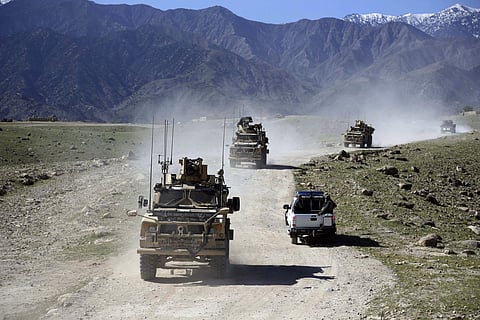

WASHINGTON: US National Security Advisor H R McMaster has said that 'winning in Afghanistan' doesn't mean 'creating a state in US image' but ensuring that terror groups in that country do not mobilise resources and raise funds to conduct acts against America and its allies.
"Winning in Afghanistan is really aimed at allowing Afghanistan to be Afghanistan. As the President said, not to nation-build, not to create a state in US image," McMaster told reporters at a White House news conference yesterday.
He was responding to questions on a winning strategy in Afghanistan.
"Winning in Afghanistan means that there are not terrorist groups who are able to control key parts of the territory and population centers there that could be used to mobilise resources, raise funds, use those funds to then organise, plan, and conduct acts against us and our allies and partners," he said.
"And so that's what the success is, is really a sustainable outcome there that ensures the safety and security of the American people. Afghanistan is connected to broader security concerns across the region.
"So the outcome is to ensure that a threat from that region doesn't threaten the safety and security of the American people," the top American national security advisor said.
Responding to a question, McMaster acknowledged that no one is confident if the Taliban would come back for talks.
"No, I don't think I'm confident," he said when asked that given the history and the ideology of the Taliban, a political solution settlement could ever be reached with the Kabul government, that wouldn't end up once US forces leave Afghanistan.
"The Afghan people remember 1996 to 2001 pretty vividly, and what it was like to live under that brutal regime.
Now, the Taliban, as I mentioned - we work hard sometimes to disconnect the dots here, especially in connection with the Taliban's relationship with al Qaeda, the Taliban's relationship with other terrorist organisations," he said.
"But what we also recognise is none of these groups are monolithic or homogeneous either.
"So if there are those who are ready to join a political process, like Hezb-e-Islami Gulbuddin did over the past year, then I don't think the Afghan government would object to that in any way," he added.
McMaster said in terms of the outcome in Afghanistan and, broadly, with South Asia strategy, the President has given a very clear guidance to prioritise the safety and security of the American people.
The second thing is, he said, that he wanted the US to have a sound regional strategy in Afghanistan, not a strategy that lasts a year.
Some people have said - and I think there's an element of truth to this - that we've had 16 one-year strategies in Afghanistan," he observed.
"And so you see a fundamental change in an outcomes-based strategy rather than a time-based strategy.
"What that does is give us the greatest chance to combine what we're doing militarily, largely in support of the Afghan government and their long struggle against terrorists and groups and the Taliban, but also to integrate that with what we hope to achieve diplomatically," he said in response to a question.
"I think it was clear to anyone that the approach of, "Well, let's talk with the Taliban and tell them we're leaving at the same time," how would that ever work? Especially when the Taliban were making battlefield gains associated in large measure with our disengagement from the fight with the Taliban in support of the Afghan forces," he said.
So we took a broad approach at this -- looking at this with our intelligence community and our partners, and the President has also asked us, how can others do more? How can others share more of the burden and the responsibility? And so this strategy delivers on all of that," he said.